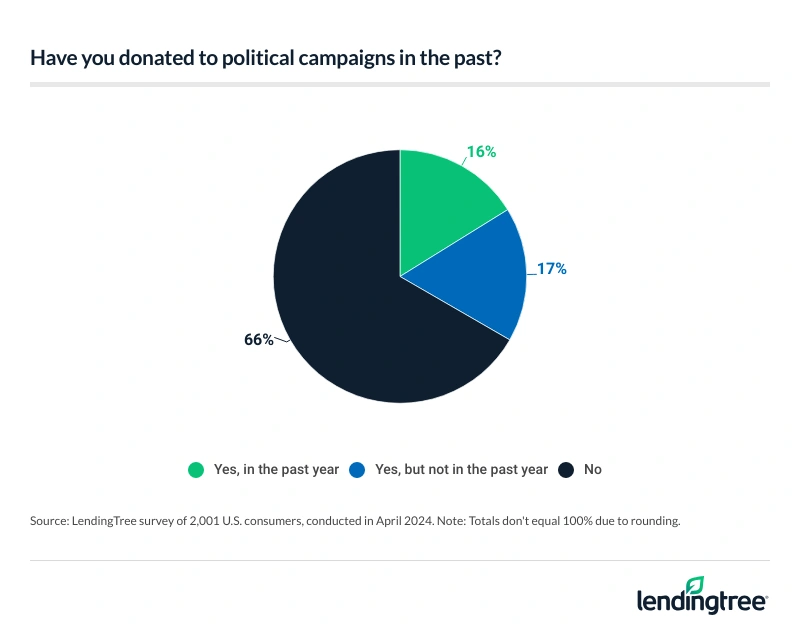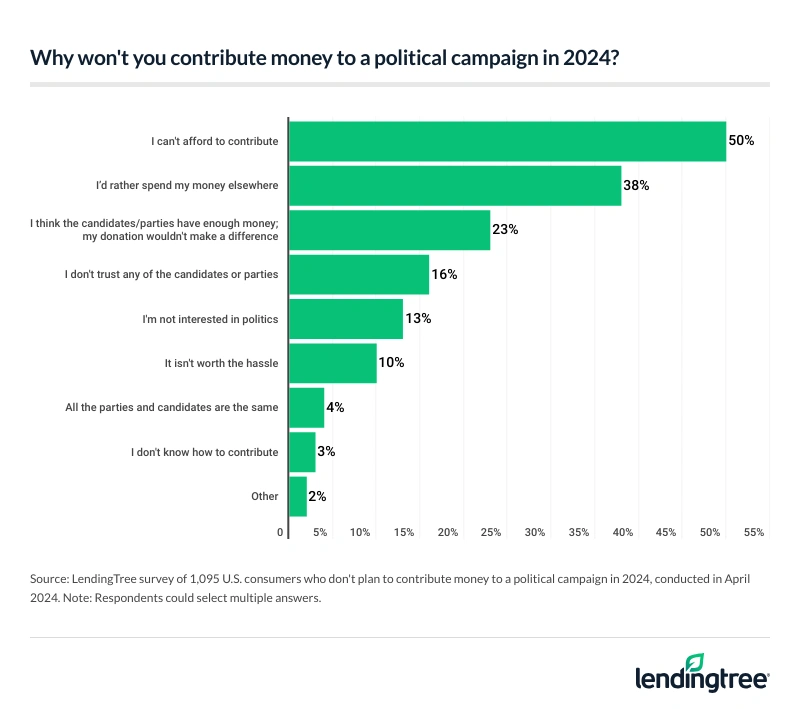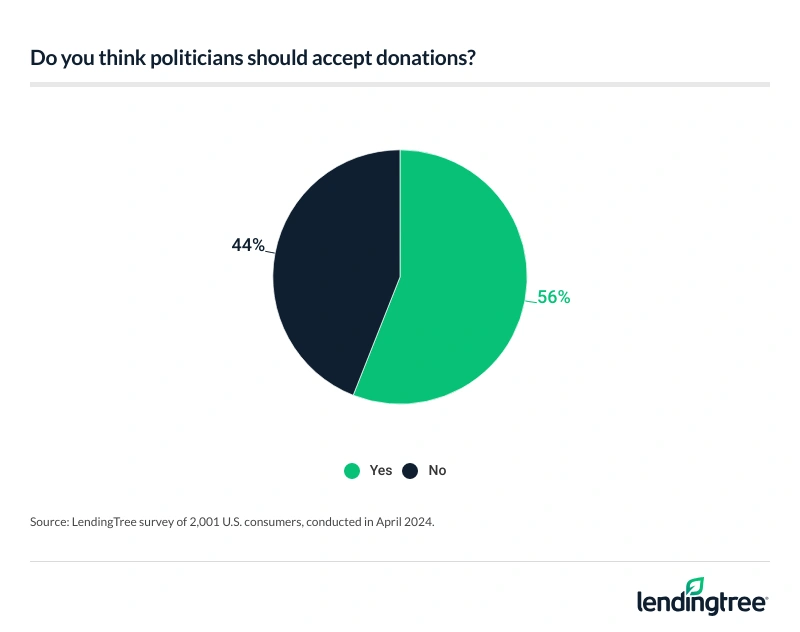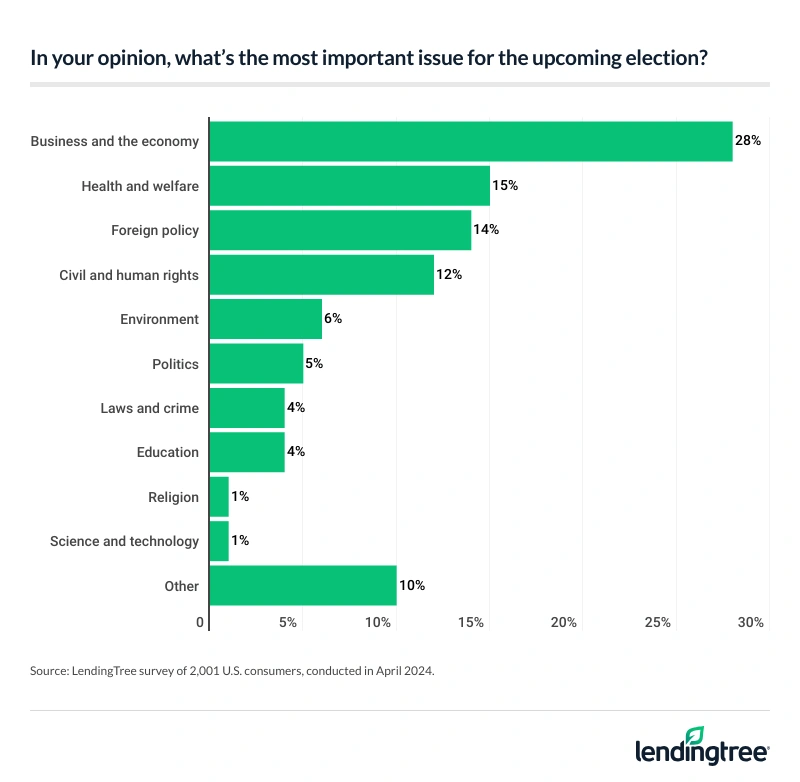Fewer Americans to Make Political Donations in 2024 Presidential Election Season Than in 2020s
Just 26% of Americans say they plan to contribute money to a political campaign this year, down 10 points from 2020, according to a new LendingTree survey.
With the next presidential election looming months away, LendingTree asked Americans whether they planned to give to campaigns — presidential, federal, state or local — in 2024 and inquired about their views on the state of money in elections.
While there are a million possible reasons why more people plan to hold on to their cash this time, including dissatisfaction with the candidates, affordability is the most common.
Comparing 2020 data to any other year can be tricky. It’s important to note that our 2020 polling was completed in early January of that year — almost two months before widespread COVID-19 lockdowns began in the U.S. That means the pandemic didn’t factor into the views shared by our 2020 respondents.
- As the 2024 presidential election season approaches, fewer Americans are showing support with their wallets than during 2020. About a quarter (26%) of Americans plan to contribute money to a political campaign this year, a 10-point decrease from 36% in 2020 — the last presidential election year. (Meanwhile, 55% don’t plan to do so in 2024, and 19% aren’t sure.)
- Democrats are more likely to say they plan to donate than Republicans. 35% of Democrats expect to contribute money this year, versus 27% of Republicans. When asked why they’ll give, 39% said they passionately support a candidate, 38% are passionate about a specific issue and 34% passionately support their party.
- Most Americans have never donated to a campaign. Overall, nearly two-thirds of American adults (66%) have never donated to campaigns. Among those who have, 29% plan to increase their contributions this year. Additionally, 70% of past donors believe their contributions make a difference and 50% have been moved to donate after seeing an ad from a candidate or political party.
- For many, donations just aren’t in the budget. Among the 55% of Americans who won’t donate to a campaign this year, 50% say they can’t afford to, 23% say they don’t think their donation would make a difference and 16% don’t trust any candidates or parties.
- Many Americans would change how elections are run if they had the chance. Overall, most Americans agree that money has too much influence on politics (83%). 44% of Americans don’t think politicians should accept donations, 67% think election seasons should be shorter and 76% think there should be a limit on how much politicians can spend on elections. Additionally, 75% don’t believe candidates should be able to use political donations for legal fees and/or non-campaign-related spending.
Fewer Americans plan to donate in 2024 than in 2020
In early 2020, more than 1 in 3 Americans (36%) told LendingTree they planned to contribute to a political campaign that year. Younger Americans were most likely to say they’d contribute, with 49% of Gen Zers and 41% of millennials planning to do so, versus 37% of Gen Xers and 25% of baby boomers.
Fast forward four years, and far fewer Americans (26%) intend to contribute. (More than half of Americans — 55% — don’t intend to, while another 19% aren’t sure.) Meanwhile, the generation gap has grown even more stark, with 43% of Gen Zers ages 18 to 27 and 33% of millennials ages 28 to 43 planning to donate, versus 17% of Gen Xers 44 to 59 and 14% of baby boomers ages 60 to 78.
There are wide disparities in other demographics, too:
- 33% of men say they plan to donate, versus 19% of women
- 39% of those making $100,000 or more a year say so, versus 17% of those making less than $30,000
- 37% of parents of young kids, versus 23% of those without children
- 17% of independent voters, versus 35% of Democrats and 27% of Republicans
When asked why they plan to give, 39% said because they passionately support a candidate. That’s the most common reason, followed closely by 38% passionate about a specific issue and 34% passionate about their party.
Further down the list — but representing a significant portion of the population — 20% plan to donate because they passionately oppose another candidate. Also, 13% of respondents say they plan to give because they “feel it’s part of my duty as an American.” Republicans (17%) are more likely than Democrats (11%) to say that.
Most Americans have never donated to a campaign
When it comes to political donations — and, let’s face it, most anything else — intent doesn’t always equal action. For example, according to OpenSecrets, just 1.9% of American adults gave more than $200 to “federal candidates, PACs, parties and outside groups in 2019-2020.”
When you factor in smaller donations, as well as those made at the state and local levels, the percentage of donors rises well beyond that, though how high is unclear. However, it would require a huge leap for that number to match the percentage of those who said they intended to donate, meaning that a lot of people keep their money in their pockets instead.
Further illustrating that point, our survey found that only about a third of Americans have previously donated to campaigns.

The demographic breakdown of those most likely to say they’ve donated in the past looks similar to that of those intending to donate this year: those making $100,000 a year (49%), parents of young kids (45%), Gen Zers (42%) and men (39%).
Among previous donors, 29% plan to donate more this year than in 2020. That’s nearly double the 16% who say they’ll donate less. The gender gap is significant here: Men are nearly three times more likely to say they’re donating more than reducing their donations (35% and 12%), while women are equally likely to be raising or lowering their donation total (20% for each).
Additionally, 30% of past donors strongly believe their contributions make a difference, while another 40% somewhat agree. Just 8% disagree.
Data also clearly shows that advertising pays: Half of previous donors (50%) say they’ve been spurred to action by an ad from a candidate or political party. Gen Zers are far more likely to say so than other groups (76%, versus 59% of millennials, 38% of Gen Xers and just 21% of baby boomers).
For many, donations just aren’t in the budget
Ultimately, the most common reason people gave for why they wouldn’t donate to a campaign this year is simple — and eminently understandable: They can’t afford to. Among the 55% of Americans who won’t donate to a campaign this year, half said this.

Women are significantly more likely than men to say they aren’t donating because they can’t afford to (56% versus 44%).
Nearly 4 in 10 (38%) say they’d rather spend their money elsewhere, 23% say they don’t think their donation would make any difference and 16% don’t trust any candidate or party. Meanwhile, 13% say they won’t donate because they’re not interested in politics.
Many Americans would change how elections are run if they had the chance
What most everyone agrees on, however, is that money has too great an influence on politics, with 83% saying so. Election campaigns are often filled with messages about the need for change, but our survey found that Americans believe the election process desperately needs change. For example:
- 76% think there should be a limit on how much politicians can spend on campaigns
- 75% don’t believe candidates should be able to use political donations for legal fees and/or non-campaign-related spending
- 67% think election seasons should be shorter
- 44% of Americans don’t think politicians should accept donations

While we don’t seem to agree on much politically anymore, frustration with the outsized impact of money on politics seems to be an exception: 86% of Republicans agree that money plays too big a role in politics, as do 84% of Democrats and 83% of independents. Also, while 80% of independents agree that there should be limits on how much politicians can spend on campaigns, 78% of Democrats and 74% of Republicans do, too.
Despite these numbers, no one should expect money to play less of a role in politics anytime soon.
Be mindful of your finances when helping your favorite candidate
It shouldn’t surprise anyone that our survey showed that the economy is issue No. 1 for consumers.

As mentioned earlier, it’s also the primary reason given by people who say they won’t contribute to political campaigns. However, if money is tight and you still want to contribute to your favorite candidate or party, here are some things to consider:
- Break up your donations: You don’t have to give in huge sums all at once. Campaigns are happy to take as much money as you want to give — up to federal contribution limits — whenever you want to give it. Say you want to give $500 this year to a favorite candidate. Instead of giving it all today, consider giving $100 a month for the next five months.
- Be wary of what you’ve signed up for: Campaigns are making it easier for people to sign up for regularly recurring donations. While recurring payments can be useful to extend your donation budget, they can be an unpleasant surprise if you opt in unintentionally. (Our survey shows that 30% of Americans are hit up via text for political contributions daily or weekly. Among those solicited for a contribution via text, two-thirds say they’ve never signed up to receive them.) To check, make sure the confirmation you get with your donation says it was a “one-time” donation. If it doesn’t, contact the organization to confirm.
- Pay with your credit card, but be careful: Paying with plastic can protect you if you inadvertently sign up for recurring donations. It can also give you a little bit of extra time to pay off that donation you wanted to make. But there are downsides. Plastic makes it easy to overspend, and that’s not great, even if the cause you’re supporting is. Plus, paying with plastic means your full donation might not go to the campaign since the organization will likely have to put some of the funds toward credit card transaction fees.
- Donate time rather than money: It may be noble to want to give more and more to support a cause meaningful to you, but overdoing it can cause financial issues. If you want to help but can’t afford to give much money, you can always donate your time and sweat. Campaigns are almost always in dire need of people to help knock on doors, make phone calls and do other tasks, so don’t be afraid to reach out.
Methodology
ValuePenguin commissioned QuestionPro to conduct an online survey of 2,001 U.S. consumers ages 18 to 78 from April 15 to 17, 2024. The survey was administered using a nonprobability-based sample, and quotas were used to ensure the sample base represented the overall population. Researchers reviewed all responses for quality control.
We defined generations as the following ages in 2024:
- Generation Z: 18 to 27
- Millennial: 28 to 43
- Generation X: 44 to 59
- Baby boomer: 60 to 78

